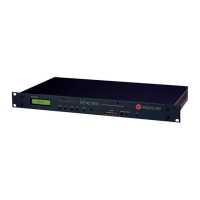S01PEQOA1,2,1,1250,40,-20,1,1
Set the
parametric EQ on
output 1 , band 2
to the following
parameters: type
= parametric
filter, frequency
= 1250 Hz,
bandwidth = 40
1/100th octaves,
gain = -20 dB,
enabled = yes,
slope = 1 dB per
octave. The
value of the
slope parameter
is irrelevant for
this type of filter,
we could have
set it to
anything.
S01PEQOA1,2,1,1250,40,-20,1,1
S01PEQOAB,1,?
Query the
current
parameter
settings for the
parametric eq
filter on output B
, band 1.
S01PEQOAB,1,t,f,b,g,s,e , where
the parameters t, f, b, g, s, and e
correspond to the current settings of the
type, frequency, bandwidth, gain, slope,
and enabled parameters, respectively. If
this filter was set to the same parameters
as given in the above example, the status
message would be
S01PEQOAB,2,1,1250,40,-20,1,1 .
8.122. PEQOB -- Set Bandwidth Parameter for Specified
Parametric EQ Output Stage
This command sets or queries the bandwidth parameter (in 1/100th octaves) for the parametric
equalizer (EQ) filters on output channels 1, A, B, and T . Each channel has five bands of parametric
EQ that can be independently controlled.
The minimum and maximum values for the bandwidth parameter are 5 and 200, respectively.
This command has the same format and restrictions as the
PEQOA command except that only one
parameter, the bandwidth, is specified instead of all the parameters. See the
PEQOA command for
more information. To set the bandwidth parameter for an input parametric EQ filter, use the
PEQIB
command. To set all the parameters for an input parametric EQ filter, use the
PEQIA command.
This command is saved to non-volatile memory only as part of a preset. The state of this command
will be restored after power-up only if a preset is saved and that preset is set to be the power-on

